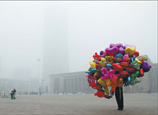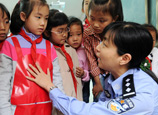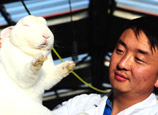
From "Gangnam Style" to "carrier style", the English word "style" has become part of Chinese hot phrases.
According to the 2012 Chinese Language Situation report, which was released by the Ministry of Education and National Language Committee of China on June 5, some words that use the Roman alphabet became frequently used new words last year. But language experts say this is normal.
"The combination of different languages is part of their development, so we don't have to be overly worried about an invasion of foreign languages," said Yang Erhong, a professor at Beijing Language and Culture University.
"We should believe in the ability to filter and develop language itself," Yang said. "As time goes by, we can decide if those foreign elements will stay or not."
The phrase pattern of " style" became well known from the South Korean music video Gangnam Style, which took the online world by storm in 2012.
After the successful landing and subsequent takeoff of a Shenyang J-15 carrier-borne fighter jet in China, netizens called the gestures that the crews used for takeoff and landing "carrier style".
Now, the phrase pattern is one of the most popular among Chinese, and can be heard even in the media from time to time.
Han Baocheng, a professor at Beijing Foreign Studies University, agreed that the popular use of the phrase is part of normal language evolution.
"As communication among different countries becomes increasingly frequent, it is normal to have foreign-language elements merge with the Chinese language," Han said.
The word "style" is not the only case.
"H group", which describes a group of people who believe in and adopt a specific lifestyle, is also a term featuring a foreign language element that became popular in 2012. The "H" stands for high, healthy, honest, harmony, honey, hope and handsome.
Another example, "can hold", created by people in Hong Kong, has become widely used by netizens since its use on a reality TV show. It refers to the confidence to conquer difficulties and get control of harsh situations.
"These phrases are hot at present because they are newfangled and vivid, making people feel more interested in them," said Han, who is also the deputy director of the Foreign Language Research Institute.
"But 'hot' things will not last forever. They may become 'cold' one day because language is changing all the time and people may become fascinated by other new phrases," Han said.
It is the eighth time the ministry and the committee have jointly compiled and released the report on Chinese language.
Expressions such as "the Chinese dream", "beautiful China", "the voice of China" and "the Mo Yan-craze" were also among the hottest terms last year, according to the report.
Others included "Diaoyu Islands", "the year of election", "London Olympics" and "the Syrian crisis", all of which reflect the ever-changing situation of the international community.
The report also lists popular phrase patterns based on hot social issues last year: "the most beautiful ", "Chinese " and " house".
"These popular phrases give a complete picture of people's lives in China in 2012," Tian Lixin, head of language affairs for the Ministry of Education, said at the news conference on the report.
















 Turn white rabbit to 'gold' - A young entrepreneur's goal
Turn white rabbit to 'gold' - A young entrepreneur's goal


![]()
